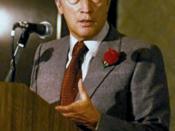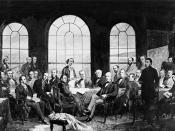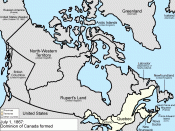Political fallacies are a prominent aspect of the Canadian political landscape, from John A. Macdonald?s railway scandal, to the recent significant underestimation of the gun registry cost. In each case the initial policy framework attempts to combine personal political ambitions with political policy, a mixture which proves to be insoluble to public approval. In the 1960?s, Canada was introduced to a new type of political leader, a person who was not afraid to mix emotion with policy, who preferred indecision as opposed to compromise . Pierre Elliot Trudeau, Canada?s most popular Prime Minister, left a significant mark on the Canadian landscape. A trademark for change, Trudeau opened Canada?s borders to new arrivals, socialized government agencies and strived to create a Canadian identity which is not so similar to the United States by embracing the founding peoples of Canada, the French. The declaration of Canada as a bilingual nation was the most prominent aspect and undoubtedly left the largest visible mark on the Canadian landscape.
Among Trudeau?s achievement lye political fumbles, among the most apparent is the enactment of the War Measures Act. The War Measures Act is the single most irresponsible action taken by the Canadian government in the past 40 years, Trudeau?s biggest fumble in an otherwise successful political career. The primary reason for enacting the act was the issue regarding the FLQ, a largely regional problem that involved Quebec alone. However, the negative ramifications of the War Measures Act were felt throughout the country. Economically, Canadian markets and companies faired negatively in domestic and international markets. Socially, unwarranted police raids of homes and businesses from British Columbia to Newfoundland & Labrador terrorized innocent civilians. In addition, the resolution of the FLQ crisis did little to stem the argument for a sovereign Quebec, damaging the credibility...


